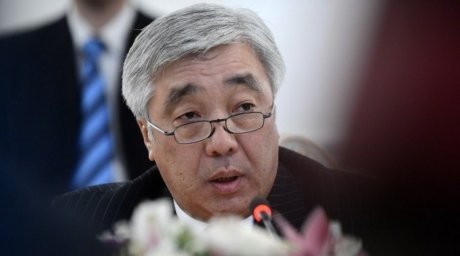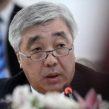
Kazakhstan Promotes Central Asian Interests Within OIC
Publication: Eurasia Daily Monitor Volume: 10 Issue: 29
By:

In recent years, Kazakhstan has made an effort to deepen and expand cooperation with the world’s Islamic community. The focus has been on economic and cultural ties, but political and security issues have also been prominent due to the large number of internal and regional conflicts afflicting Muslim majority countries. Toward this end, in 1995, Kazakhstan joined the Organization for Islamic Conference (OIC), which was established in 1969. Kazakhstan then became the first Central Asian country to chair the organization as the rotating head of its Council of Foreign Ministers (CFM) from June 2011 to November 2012.
Foreign Minister Erlan Idrissov reaffirmed Kazakhstan’s traditional policy stances when he attended the 12th OIC summit in Cairo, which met February 6–7, 2013. Idrissov stated that Kazakhstan considers the OIC a common collective voice of the world’s Muslims as well as a mechanism for promoting international cooperation and security. He identified a major task of the OIC as helping promote peace and progress as well as meeting Muslims’ other needs. The summit’s final communique supports many of Kazakhstan’s core foreign policy positions: the Universal Declaration of a Nuclear-Free World, the Central Asian nuclear-weapons-free zone, active participation of OIC members in the EXPO-2017 in Astana, establishing the headquarters of the OIC Food Security Institution in Astana, the OIC Action Plan for cooperation in Central Asia, and marking the tenth anniversary of the Congress of World and Traditional Religions, an institution hosted by Kazakhstan every three years to promote dialogue and mutual understanding among the world’s religions (Kazakhstani Foreign Ministry, February 7).
Although Kazakhstan’s OIC membership helps affirm their country’s Muslim heritage, Kazakhstani officials describe the OIC less as a “religious" body and more as a multilateral intergovernmental institution of Muslim states seeking to cooperate on essentially non-religious security, economic and diplomatic issues (Yerzhan Kazykhanov: Eurodialogue, August 24, 2012). The OIC is the largest inter-governmental organization after the United Nations in terms of participants, geographic coverage and network of specialized organs. Its 57 members are comprised of Muslim-majority countries that have a combined population of approximately 1.5 billion people. Its members possess more than one fifth of the world’s population, two thirds of the world’s energy resources and an estimated 40 percent of the world’s raw materials.
When Kazakhstan relinquished the rotating OIC chairmanship at the 39th CFM Session held in November 2012 in Djibouti, Idrissov said that the key themes of the Kazakhstani OIC chairmanship had been “peace, cooperation and development.” He noted that Kazakhstan worked to promote successful transitions in those countries of North Africa and the Middle East that were experiencing regime change. In addition to supporting benign economic and political conditions for the new states, Idrissov said that Kazakhstan’s most important goal was “to prevent Islamic nations from falling into the hands of extremists.” Kazakhstan also tried to reduce conflicts in Syria, Afghanistan, Mali, the Philippines, Somalia and Sudan. Another focus “was the development of religious dialogue platforms to promote peace and security within the OIC area” (Kazakhstan Foreign Ministry, November 23, 2012).
According to Idrissov, the cooperation agenda resulted in the creation of the OIC Independent Permanent Human Rights Commission, the implementation of the OIC Water Concept, and the adoption of the OIC Plan of Action for Central Asia. Kazakhstan used its influence in other international organizations such as the European Union, the Organization for Security and Cooperation in Europe (OSCE), and the Shanghai Cooperation Organization to deepen their ties with the OIC. Furthermore, Kazakhstan launched a campaign that secured more than half a billion dollars in humanitarian disaster assistance for Somalia (Kazakhstan Foreign Ministry, November 23, 2012).
In Idrissov’s view, the economic development focus was evident in Astana’s hosting of the seventh World Islamic Economic Forum in June 2011 on the theme of “Global Economic Development.” Kazakhstan also worked with the Islamic Development Bank to launch a Small and Medium Entrepreneurship Fund and is establishing the KazAid Agency to provide substantial technical assistance to other OIC states and Central Asian countries. Its focus on sustainable development was seen in Kazakhstan’s calling for the establishment of an OIC Food Security Office in Astana and in the country’s “Green Bridge” initiative, which supports the development of green economies throughout the world (Kazakhstan Foreign Ministry, November 23, 2012).
From the perspective of the other OIC members, Kazakhstan brings important economic, cultural, and diplomatic assets to the organization. Kazakhstan has the largest economy of the five Central Asian states, has developed close ties with the Islamic Development Bank (IDB) and adopted a Law on Islamic Finance and Islamic Banking System. The IDB has provided loans and supported other important projects such as constructing the Western Europe–Western China international road corridor, equipping the Syzganov Surgical Institute in Almaty, and assisting Kazakhstan’s small- and medium-sized businesses. Kazakhstan has worked with the IDB to develop Islamic banking as one of the fastest growing components of its financial market (https://www.isdb.org/irj/go/km/docs/documents/IDBDevelopments/Internet/English/IDB/CM/Publications/Parnership_Strategies/Kazakhstan.pdf).
Furthermore, Kazakhstan represents the neglected Central Asian heritage of the world’s Muslim community (which was detached from the wider Muslim world during the near century of Soviet rule) and has a moderate Muslim tradition that eschews violence and favors intra-religious dialogue. Kazakhstan works with the Islamic Educational, Scientific and Cultural Organization (ISESCO) to preserve and restore its unique Islamic cultural heritage. The IESCO has designated Almaty as the “Capital of Islamic culture in Asia” for 2015. In addition, Kazakhstan also serves as a bridge between the OIC and key non-Muslim regions. It has good relations with Russia, China and other important non-OIC countries, including the larger OSCE region, which includes the United States and most European countries. When Kazakhstan was selected as OIC chair, it had already been awarded the prestigious chairmanship of the OSCE for 2010. According to Idrissov, Kazakhstan has three priorities in its future policies toward the OIC: regional stability, gradual political modernization, and building OIC capacity such as by strengthening its ties with the G20, the EU, the OSCE and the Shanghai Cooperation Organization (Kazakhstani Foreign Ministry, Nov 16, 2012). Achieving these goals will prove challenging, however, as long as the civil strife continues in Syria and other Middle Eastern states, Islamist extremism remains strong in Iran and other Muslim countries, and the OIC remains divided on important economic, political, security and religious issues.




